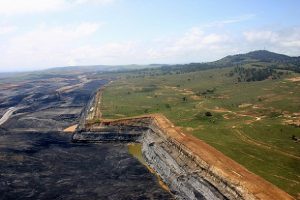
Image: Greenpeace/Murphy
The world is shifting away from fossil energy, including countries that are key importers of Australia’s coal and gas. Australia’s economic and energy policies are yet to acknowledge this reality, linking economic prosperity with continued exports of fossil fuels. This leaves Australia at risk of stranded investments, continued write-downs of export revenue and a growing current account deficit.
The Fossil Economy report investigates the revenue expectation of Australia’s emissions-intensive exports, comparing Australian Government projections with projections from the International Energy Agency. These projections include the business-as-usual New Policies Scenario, and the climate change mitigation 450 ppm Scenario. This indicates a potential shortfall in export revenue growing to AU$100 billion annually by 2030.
To avoid becoming a fossil economy, policy makers must first acknowledge the impacts of effective global action on climate change. To ensure prosperity into the future, Australia should take advantage of the global shift to clean energy, as well as diversifying the economy.
Carbon Crisis
The Carbon Crisis report follows on from Fossil Economy, and focuses on the impacts on Australia’s trade in emissions-intensive technologies that international mitigation efforts will have.
As key trading partners signal their intention to stop importing Australian coal and other emissions-intensive products, Australia is still relying on these exports to increase in both volume and value.
Major findings:
- Investment in fossil fuel export infrastructure will take decades to pay off – over the next decade, international action on climate change will see demand for Australian coal drop significantly – not only will assets be stranded, but it’s unlikely governments will see their investments and subsidies paid back.
- There are a number of risks to the economy. Climate change is the greatest of them. It is also the one risk that can be planned for effectively. If we don’t start planning for it, we could go into a very deep, very damaging recession.
- By the time we’re actually experiencing the impacts of climate change, we’ll be too far down the path we’re currently on to be able to change. The government is relying on increased coal exports where those exports will actually drop. We need to switch horses, fast.
For more information: http://bze.org.au/fossileconomy

